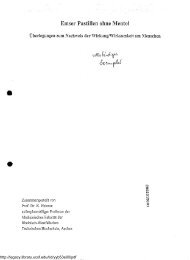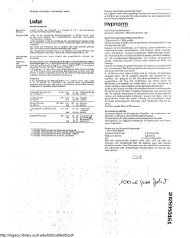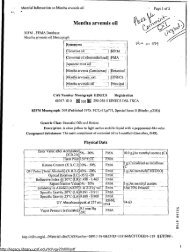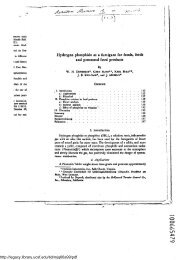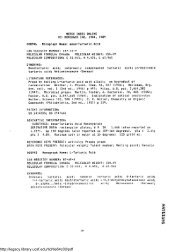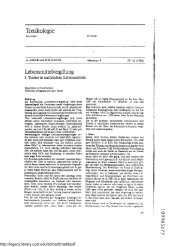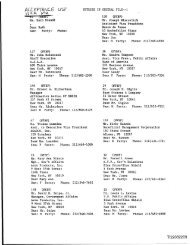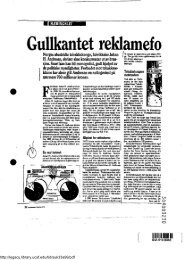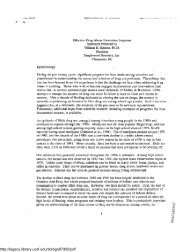How business, doctors and journalists prey on your food anxieties I
How business, doctors and journalists prey on your food anxieties I
How business, doctors and journalists prey on your food anxieties I
Create successful ePaper yourself
Turn your PDF publications into a flip-book with our unique Google optimized e-Paper software.
trounced three times in presidential electi<strong>on</strong>s, his thesisthat<br />
gold was an oppressor of hardworking peoplestuck<br />
. But the events of the 1920s <str<strong>on</strong>g>and</str<strong>on</strong>g> 1930s drove the<br />
intellectual stake through the heart of the yellow metal .<br />
After World War 1, Britain made the same mistake that<br />
we had made after the Civil R-ar . L<strong>on</strong>d<strong>on</strong> had g<strong>on</strong>e off<br />
gold in 1914 at the start of WWI <str<strong>on</strong>g>and</str<strong>on</strong>g> had experienced<br />
serious inflati<strong>on</strong> . In the 1920s Britain deflated credit in<br />
order to establish the prewar parity between sterling <str<strong>on</strong>g>and</str<strong>on</strong>g><br />
gold . The return to gold in 1925 was blamed for the<br />
subsequent distress of Britain's large coal industry <str<strong>on</strong>g>and</str<strong>on</strong>g><br />
the nati<strong>on</strong>al general strike that followed a year later .<br />
Gold received its ultimate discrediting with the advent of<br />
the Great Depressi<strong>on</strong> in 1929 . In the wake of the collapse of<br />
world commerce <str<strong>on</strong>g>and</str<strong>on</strong>g> flrtance, brought <strong>on</strong> by the horrific<br />
Smoot-Hawley tariff, the U .S . <str<strong>on</strong>g>and</str<strong>on</strong>g> Britain adopted mistaken<br />
policies in the name of staying <strong>on</strong> the gold st<str<strong>on</strong>g>and</str<strong>on</strong>g>ard . Britain<br />
tightened credit instead of easing it. The U .S . enacted a subsrantial<br />
tax increase, deepening<br />
the c<strong>on</strong>tracti<strong>on</strong> . Instead of utilizing<br />
tax <str<strong>on</strong>g>and</str<strong>on</strong>g> m<strong>on</strong>etan, policies to<br />
help alleviate distress, Britain<br />
ab<str<strong>on</strong>g>and</str<strong>on</strong>g><strong>on</strong>ed the gold st<str<strong>on</strong>g>and</str<strong>on</strong>g>ard in<br />
1931, <str<strong>on</strong>g>and</str<strong>on</strong>g> the U .S . sharpiy devalued<br />
the dollar in 1934 . Ever<br />
since, the gold st<str<strong>on</strong>g>and</str<strong>on</strong>g>ard has been<br />
portrayed as a principal cause of<br />
the Depressi<strong>on</strong> instead of as a<br />
victim of misguided policy.<br />
In 1944 the U .S . <str<strong>on</strong>g>and</str<strong>on</strong>g> Britain<br />
created what became known as<br />
the Brett<strong>on</strong> Woods internati<strong>on</strong>al<br />
m<strong>on</strong>etary system . The dollar remained fieed to gold at<br />
$35 per ounce . Other currencies were tied to the dollar,<br />
with <strong>on</strong>le a small b<str<strong>on</strong>g>and</str<strong>on</strong>g> for fluctuad<strong>on</strong>s . Instituti<strong>on</strong>s were<br />
created to help countries cope with fitture blance-of-pa y-<br />
ments problems <str<strong>on</strong>g>and</str<strong>on</strong>g> to stimulate recovery from the war .<br />
Brett<strong>on</strong> It%oods, GATT, NATO <str<strong>on</strong>g>and</str<strong>on</strong>g> other measures<br />
helped bring <strong>on</strong> the great boom of the 1950s <str<strong>on</strong>g>and</str<strong>on</strong>g> 1960s .<br />
There were exchange-rate crises, but, bv today's st<str<strong>on</strong>g>and</str<strong>on</strong>g>ards,<br />
devaluati<strong>on</strong>s were infrequent . When a cotmtry's<br />
currency came under attack, authorities took immediate<br />
remedial measures . Inflati<strong>on</strong>, w-hen it flared, was quickly<br />
brought under c<strong>on</strong>trol . N<strong>on</strong>etheless, sentiment against<br />
gold grew, Most antigoldsters advocared letting all exchange<br />
rates float against <strong>on</strong>e another, making m<strong>on</strong>ey<br />
simplv another commodirv. Simultaneouslv, American<br />
policymakers got the noti<strong>on</strong> that the dollar's role as a<br />
reserve currency posed intolerable financial burdens . As<br />
our trade surplus shrank, cries for devaluati<strong>on</strong> grew .<br />
The U .S . began moving off gold in the late 1960s,<br />
formally severing the link when President Nix<strong>on</strong><br />
imposed price <str<strong>on</strong>g>and</str<strong>on</strong>g> wage c<strong>on</strong>trols in 1971 . But the new<br />
regime of floats failed miserably. Instead of increased<br />
prosperitv, we got a debilitating decade of rising inflati<strong>on</strong>,<br />
collapsing equity markets <str<strong>on</strong>g>and</str<strong>on</strong>g> declining st<str<strong>on</strong>g>and</str<strong>on</strong>g>ards<br />
of living . Even the ec<strong>on</strong>omic recovery of the 1980s saw<br />
abnormally high interest rates by historic st<str<strong>on</strong>g>and</str<strong>on</strong>g>ards .<br />
The sec<strong>on</strong>d major hurdle to a new era of prosperity~<br />
our tax code . No human being underst<str<strong>on</strong>g>and</str<strong>on</strong>g>s it . The current<br />
code, which runs over 8,000 pages, with cotmtless<br />
Depressi<strong>on</strong> prime ministers <str<strong>on</strong>g>and</str<strong>on</strong>g> Treasury pooh-bahs meet <strong>on</strong><br />
eve of Engl<str<strong>on</strong>g>and</str<strong>on</strong>g>'s ab<str<strong>on</strong>g>and</str<strong>on</strong>g><strong>on</strong>ment of gold st<str<strong>on</strong>g>and</str<strong>on</strong>g>ard .<br />
thous<str<strong>on</strong>g>and</str<strong>on</strong>g>s more IRS rulings <str<strong>on</strong>g>and</str<strong>on</strong>g> interpretati<strong>on</strong>s, is<br />
bey<strong>on</strong>d redempti<strong>on</strong> . The ans« er is to start all over again,<br />
which is what the flat-tax movement is all about . Fi'ith a<br />
flat tax, rates would be slashed <str<strong>on</strong>g>and</str<strong>on</strong>g> all deducti<strong>on</strong>s d<strong>on</strong>e<br />
awav with, except for generous pers<strong>on</strong>al allowances .<br />
T vo Hoover Instituti<strong>on</strong> ec<strong>on</strong>omists, Robert Hall <str<strong>on</strong>g>and</str<strong>on</strong>g><br />
Al in Rabushka, have d<strong>on</strong>e extensive, definitive work <strong>on</strong><br />
the flat tax . Their new editi<strong>on</strong> of ZSie Flat Tax brilliantly<br />
updates their 1985 original . Under their revenue-neutral<br />
plan, a family of four would pay no federal income tax <strong>on</strong><br />
its first S25 .500 of income . Any income above that level<br />
would be taxed at the flat rate of 19% . For individuals,<br />
there would be no levies <strong>on</strong> interest, dividends, capital<br />
gains or estates . Businesses would also have a flat 19% rate<br />
<str<strong>on</strong>g>and</str<strong>on</strong>g> could write off all capital investments, including l<str<strong>on</strong>g>and</str<strong>on</strong>g>,<br />
in the year in which they were made . Any tax losses could<br />
be carried forward <str<strong>on</strong>g>and</str<strong>on</strong>g> applied against future profits .<br />
All variants being discussed take otTfrom the work of<br />
Hall <str<strong>on</strong>g>and</str<strong>on</strong>g> Rabushka . The most<br />
ambitious versi<strong>on</strong> is that of<br />
House biajoriry Leader Dick<br />
Armey (R-Tex .) . He proposes<br />
a three-year phase-in from<br />
20% to 17%, coupled with<br />
ambitious budget cuts . The<br />
exempti<strong>on</strong> for a family of four<br />
would be 536,800 . Presidential<br />
aspirant Senator Arlen<br />
Specter (R-Pa .) advocates a<br />
20% level with modified<br />
deducti<strong>on</strong>s for interest <strong>on</strong><br />
home mortgages <str<strong>on</strong>g>and</str<strong>on</strong>g> for charitable<br />
c<strong>on</strong>tribua<strong>on</strong>s . His plan, too, would exempt inteoest,<br />
dividends, capital gains <str<strong>on</strong>g>and</str<strong>on</strong>g> estates .<br />
The virtues of a flat tax are overwhelming :<br />
Produetivity. Enormous resources would be released<br />
for productive pursuits . Incalculable amounts of inrellectual<br />
brainpower arc devoted to the dead-end task of coping<br />
with the current tax code . Over 500,000 people in<br />
the U .S . make their living off it, whether in lobbying,<br />
law-yering, tax preparing or accounting . Americans spend<br />
5 .5 billi<strong>on</strong> hours a year filling out tax forms .<br />
Faimess . Under a flat tax, the higher <strong>your</strong> salary, the<br />
more you pav in tax, in c<strong>on</strong>trast to our current exempti<strong>on</strong>riddled<br />
system . The rich would pay a higher proporti<strong>on</strong> of<br />
revenues collected . This has happened even time high rates<br />
have been low'ered . The generous pers<strong>on</strong>al allowances<br />
would lop milli<strong>on</strong>s ofArnericans offtederal income tax rolls .<br />
And the tax code n ould be transparent <str<strong>on</strong>g>and</str<strong>on</strong>g> underst<str<strong>on</strong>g>and</str<strong>on</strong>g>able .<br />
EfPiciency. The flat tax would be infinitely easier to<br />
collect . Experts estimate Americans spend between $100<br />
billi<strong>on</strong> <str<strong>on</strong>g>and</str<strong>on</strong>g> 5300 billi<strong>on</strong> to comply with the current code .<br />
Anticorrupti<strong>on</strong> . The flat tax would eliminate a large<br />
source of political manipulati<strong>on</strong> at state <str<strong>on</strong>g>and</str<strong>on</strong>g> federal levels<br />
. The current m<strong>on</strong>strosity remains ripe for abuse <str<strong>on</strong>g>and</str<strong>on</strong>g><br />
behind-the-scenes deals for powerful special interests . It<br />
is no coincidence that members of c<strong>on</strong>gressi<strong>on</strong>al taxwriting<br />
committees receive <strong>on</strong> average twice the political<br />
c<strong>on</strong>tributi<strong>on</strong>s of their n<strong>on</strong>-tax-writing colleagues .<br />
The flat tax, combined with a new gold st<str<strong>on</strong>g>and</str<strong>on</strong>g>ard, would<br />
unleash a boom of unprecedented proporti<strong>on</strong>s. M<br />
154<br />
2046673413 i'orbes K August 14, 1995<br />
http://legacy.library.ucsf.edu/tid/agf97d00/pdf



